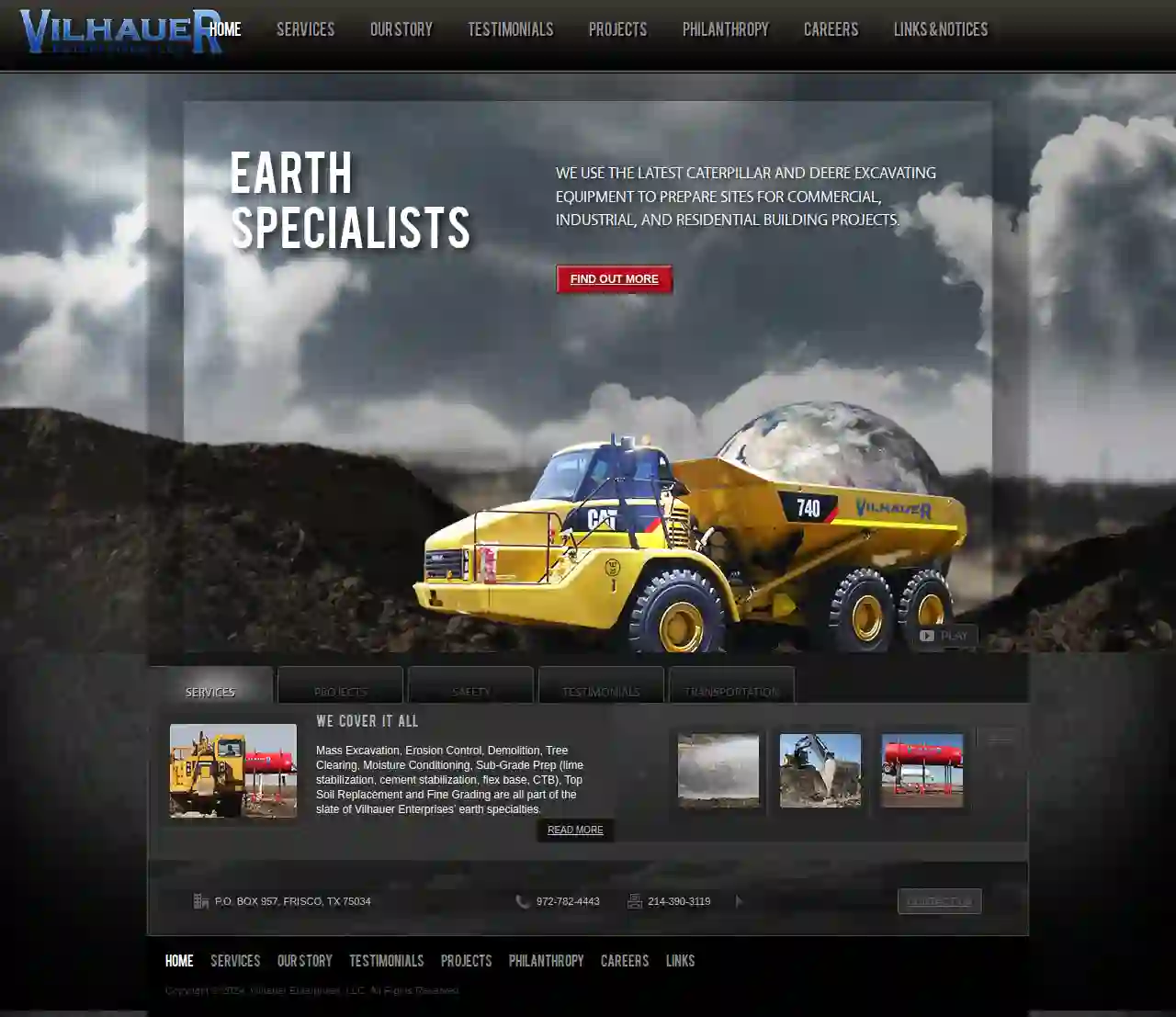Excavation Contractors Plano
Find Digging Contractors in Plano
Get up to 3 Trenching Services quotes for your project today! Compare profiles, reviews, accreditations, portfolio, etc... and choose the best deal.

CES Excavation
1123 Main Street, City, 12345, USCES Excavation: Your Trusted Partner for Excavation Services CES Excavation is a reputable and experienced excavation company serving the [CITY] area. We are committed to providing high-quality excavation services for residential, commercial, and industrial projects. Our team of skilled and experienced operators utilizes state-of-the-art equipment to ensure efficient and safe completion of every project. We take pride in our attention to detail and commitment to customer satisfaction. Whether you need site preparation, foundation excavation, utility installation, or any other excavation service, CES Excavation is your reliable partner. We work closely with our clients to understand their specific needs and deliver exceptional results. Contact us today for a free consultation and let us help you bring your project to life.
- Services
- Why Us?
Get Quote
Vilhauer Enterprises
3.721 reviewsPlano, US- Services
- Why Us?
Get Quote
Ten Point Turf and Excavation LLC
57 reviewsPlano, USWelcome to Ten Point Turf & Excavation LLC, where we sculpt dreams into reality and ground into artistry. Over 15 years of experience with land leveling and other services. Our artificial turf installation and excavation service is more than just dirt and grass; it's the foundation of your vision. From precision excavation to lush, green landscapes, we dig deep to bring your projects to life! At Ten Point Turf & Excavation LLC, our mission is to provide high-quality artificial turf installation and excavation services to our customers, offering innovative solutions that enhance outdoor spaces and exceed expectations. With a commitment to professionalism, reliability, and customer satisfaction, we aim to transform landscapes with eco-friendly and sustainable practices, delivering long-lasting and aesthetically pleasing results.
- Services
- Why Us?
- Gallery
Get Quote
Rayco Excavation & Construction
52 reviewsCaddo Mills, USAbout Rayco Excavation & Construction Rayco Excavation & Construction is a professional & experienced land clearing & construction company that is located in Caddo Mills, TX. We provide our clients with a wide range of services including, but not limited to: excavation, land clearing, general construction, grading, site prep & more. Our company works with commercial, residential, & government clients, providing quality services and premier customer service on every project. To learn more about what Rayco Excavation & Construction has to offer, please select from one of the following options: (214) 708-1206 Request a Free Quote
- Services
- Why Us?
- Gallery
Get Quote
JB Tunneling For Plumbing
53 reviewsPlano, USThis Townsquare Interactive website is no longer available. If you have any questions please feel free to contact our support team at: [email protected]
- Services
- Why Us?
- Gallery
Get Quote
B Squared Excavating, LLC
518 reviewsPO Box 843, Caddo Mills, 75135, USDig Deep, Build Strong EXCAVATE EXCELLENCE, BUILD DREAMS Expert Commercial and Residential Excavation Services B Squared Excavating, LLC is your locally owned and operated dirt work expert! We handle projects ranging from excavation for new builds, large land reformation and clearing, driveways, and so much more! Ensure your project gets done right the first time! Proudly serving Hunt County and the surrounding area for over seven years! Call Us Today! 903-450-7586
- Services
- Why Us?
- Our Team
- Gallery
Get Quote
Know Before You Dig Locates, LLC
52 reviews18208 Preston Road, Suite 346, Dallas, 75252, USAbout Us With over three decades of experience in the utility locate industry, Know Before You Dig Locates, LLC, provides accurate and dependable utility locate services to the utility and excavation industries. Our focus is safety, ensuring everyone returns home safely each day. As your Utility Damage Prevention Consultant, we prioritize your safety above all else. We recognize the complexities involved in public and private utility locate requests. That's why we've streamlined our services to guide you through this complex locate system. Knowing before you dig is crucial, and our expertise ensures that you have the information you need to proceed safely. While our primary goal is to locate buried facilities, we go beyond by educating our clients on our processes and their responsibilities when breaking ground. Whether you're a seasoned veteran or new to excavation work, we're here to ensure your projects are completed safely and on schedule. Our highly skilled Utility Locate Technicians (ULTs) utilize cutting-edge electromagnetic locate and ground penetrating radar equipment. This combination of equipment enables us to deliver professional, prompt, and precise locates to our clients.
- Services
- Why Us?
- Gallery
Get Quote
Rueben Excavation LLC
57 reviewsPlano, USLeading Underground Utilities, Construction, and Hydrovac Services Company Serving Dallas-Fort Worth Metroplex We are the excavation experts, tailoring custom solutions for every project. Whether meeting or creating a plan that aligns with your specific requirements, we pride ourselves on delivering professional results that consistently exceed expectations and build lasting relationships. Why Ruben? At Rueben Group, we are the leading experts in comprehensive underground utility and excavation services throughout the Dallas-Fort Worth metroplex. Our wide range of services includes fireline installation, septic systems, utility duct bank installation, hydrovac services, sewer and water line installation, as well as emergency sewer line repair and utility repair. With a commitment to precision, safety, and sustainability, we deliver superior solutions for both complex infrastructure projects and urgent repairs. Choose Rueben Group for unmatched expertise and reliability, ensuring excellence in every aspect of underground utility solutions.
- Services
- Why Us?
- Gallery
Get Quote
BMJ Site Services LLC
1Plano, US- Services
- Why Us?
Get Quote
Pinnacle Foundation Repair
516 reviewsPlano, US- Services
- Why Us?
Get Quote
Over 3,943+ Excavation Companies on our platform
Our excavation companies operate in Plano and surrounding areas!
ExcavationHQ has curated and vetted the Best Excavation Contractors in Plano. Find a top & reliable business today.
Frequently Asked Questions About Excavation Contractors
- Excavators: Versatile machines with a bucket, arm, and rotating cab for digging, lifting, and moving earth.
- Backhoes: Similar to excavators but with a digging bucket on the back and a loader bucket on the front, ideal for trenching and smaller excavations.
- Bulldozers: Powerful machines with a large blade for pushing earth, clearing land, and leveling surfaces.
- Skid Steers: Compact and maneuverable loaders with various attachments (buckets, forks) for digging, loading, and grading in tight spaces.
- Trenchers: Specialized machines for digging narrow trenches for utilities.
- Dump Trucks: Vehicles for hauling excavated material to disposal sites.
- Determining Soil Suitability: Assessing whether the soil can support the intended structure or load.
- Recommending Foundation Types: Advising on the appropriate foundation design based on soil characteristics.
- Addressing Drainage and Erosion Issues: Providing solutions to manage water runoff and prevent erosion.
- Evaluating Slope Stability: Assessing the risk of landslides or soil movement on slopes.
- Building on challenging soil types (expansive clay, loose sand, etc.)
- Constructing large or complex structures
- Excavating near slopes or retaining walls
- Addressing drainage or erosion concerns
- New Construction: Laying foundations, basements, or underground utilities for new buildings.
- Home Additions: Creating space for new rooms, basements, or extensions.
- Landscaping: Leveling ground, creating slopes, installing retaining walls, or digging for ponds or pools.
- Drainage Improvement: Installing French drains, drainage ditches, or swales to manage water runoff.
- Utility Installation or Repair: Laying new water, sewer, gas, or electrical lines, or repairing existing ones.
- Demolition: Clearing debris and preparing the site after demolishing a structure.
- Trench Collapses: Unstable trench walls can cave in, posing a severe risk to workers. Proper shoring and sloping are crucial safety measures.
- Utility Damage: Striking underground utilities (gas, water, electric) can cause leaks, explosions, or electrocution. Accurate utility locates and careful digging are essential.
- Falling Objects: Materials or equipment falling into excavations can injure workers. Securing work areas and using appropriate safety gear is vital.
- Equipment Accidents: Operating heavy machinery involves risks of rollovers, collisions, or mechanical failures. Trained operators and proper equipment maintenance are critical.
- Environmental Hazards: Excavated soil might contain hazardous materials (asbestos, lead). Proper testing and disposal procedures are necessary.
What equipment is used for excavation?
What is a soil engineer, and do I need one?
How do I know if I need excavation for my project?
What are the risks associated with excavation?
What equipment is used for excavation?
- Excavators: Versatile machines with a bucket, arm, and rotating cab for digging, lifting, and moving earth.
- Backhoes: Similar to excavators but with a digging bucket on the back and a loader bucket on the front, ideal for trenching and smaller excavations.
- Bulldozers: Powerful machines with a large blade for pushing earth, clearing land, and leveling surfaces.
- Skid Steers: Compact and maneuverable loaders with various attachments (buckets, forks) for digging, loading, and grading in tight spaces.
- Trenchers: Specialized machines for digging narrow trenches for utilities.
- Dump Trucks: Vehicles for hauling excavated material to disposal sites.
What is a soil engineer, and do I need one?
- Determining Soil Suitability: Assessing whether the soil can support the intended structure or load.
- Recommending Foundation Types: Advising on the appropriate foundation design based on soil characteristics.
- Addressing Drainage and Erosion Issues: Providing solutions to manage water runoff and prevent erosion.
- Evaluating Slope Stability: Assessing the risk of landslides or soil movement on slopes.
- Building on challenging soil types (expansive clay, loose sand, etc.)
- Constructing large or complex structures
- Excavating near slopes or retaining walls
- Addressing drainage or erosion concerns
How do I know if I need excavation for my project?
- New Construction: Laying foundations, basements, or underground utilities for new buildings.
- Home Additions: Creating space for new rooms, basements, or extensions.
- Landscaping: Leveling ground, creating slopes, installing retaining walls, or digging for ponds or pools.
- Drainage Improvement: Installing French drains, drainage ditches, or swales to manage water runoff.
- Utility Installation or Repair: Laying new water, sewer, gas, or electrical lines, or repairing existing ones.
- Demolition: Clearing debris and preparing the site after demolishing a structure.
What are the risks associated with excavation?
- Trench Collapses: Unstable trench walls can cave in, posing a severe risk to workers. Proper shoring and sloping are crucial safety measures.
- Utility Damage: Striking underground utilities (gas, water, electric) can cause leaks, explosions, or electrocution. Accurate utility locates and careful digging are essential.
- Falling Objects: Materials or equipment falling into excavations can injure workers. Securing work areas and using appropriate safety gear is vital.
- Equipment Accidents: Operating heavy machinery involves risks of rollovers, collisions, or mechanical failures. Trained operators and proper equipment maintenance are critical.
- Environmental Hazards: Excavated soil might contain hazardous materials (asbestos, lead). Proper testing and disposal procedures are necessary.